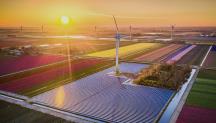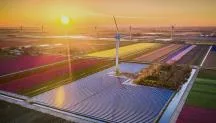Tripling Renewable Power and Doubling Energy Efficiency by 2030:IRENA, COP 28, GRA
Representing global perspectives within the renewable energy and climate change space, this report by the COP28 Presidency, IRENA and the Global Renewables Alliance (GRA) provides recommendations on the means to triple renewable power generation capacity and double the energy efficiency improvement rate by 2030.

COP28 has the vision to deliver on the pillars of the Paris Agreement,
focusing on specific action on fourparadigm shifts:
• fast-tracking the energy transition and slashing emissions before 2030;
• transforming climate finance, by delivering on old promises and setting the framework for a new deal on finance;
• putting nature, people, lives and livelihoods at the heart of climate action; and
• mobilising for the most inclusive COP ever.
KEY RECOMMENDATIONS
- TOTAL GLOBAL RENEWABLE POWER GENERATION CAPACITY WILL NEED TO
TRIPLE BY 2030 to reach more than 11 000 GW under IRENA’s 1.5°C Scenario in the World Energy Transitions Outlook, with solar photovoltaic (PV) and wind power accounting for about 90% of renewable energy capacity additions. - ENERGY EFFICIENCY IMPROVEMENTS MUST DOUBLE BY 2030 TO REMAIN ON
A 1.5°C PATHWAY. In IRENA’s 1.5°C Scenario this will be driven by a combination of efficient technologies in end-use sectors and extensive electrification. These vital milestones must be achieved to keep the global energy transition on track to meet Paris Agreement goals. - A COMPREHENSIVE MIX OF POLICIES IS NEEDED TO ACHIEVE THESE
AMBITIOUS TARGETS. Aside from deployment and enabling policies, structural change is needed to ensure the transition to an energy-efficient economy and a renewables-based power system is just and fair, and provides benefits for all. - ENERGY EFFICIENCY POLICY MEASURES should include: the adoption of targets with specific time horizons; strong regulatory frameworks including building codes and energy efficiency standards for appliances; fiscal and financial incentives; and public campaigns to build awareness of the role of energy efficiency measures, public transport and green mobility for cost savings and collective decarbonisation goals.
- RENEWABLE ENERGY DEPLOYMENT REQUIRES ENABLING MEASURES THAT GO BEYOND
REGULATIONS OR FISCAL AND FINANCIAL INCENTIVES. The organisational structures of power
sectors must be reshaped to integrate a higher share of renewables. Procurement mechanisms must be designed in a way that strengthens value chains and trade, and industrial policies must be fit for building resilient supply chains. Education, training, re-skilling and up-skilling should be prioritised; women and under-represented groups must be empowered; and collaboration between industry, civil society, policy makers and other key stakeholders should be encouraged. - EXISTING ELECTRICITY INFRASTRUCTURE SHOULD BE EXPANDED AND MODERNISED TO
CREATE A NEW ENERGY SYSTEM FIT FOR RENEWABLES. There is an urgent need to boost crosssector infrastructure planning, increase cross-border co-operation and develop regional power grids. Action is also needed to drive grid modernisation and expansion and ensure supply-side flexibility and demand-side management. - RENEWABLE POWER CAPACITY SHOULD BE INCREASED MORE RAPIDLY IN DEVELOPING
COUNTRIES, given their growing electricity demand and the important role of renewables in addressing the significant energy access deficit in these countries. - WE MUST RAPIDLY MOBILISE PUBLIC AND PRIVATE FINANCE TO TRIPLE RENEWABLE POWER CAPACITY AND DOUBLE ENERGY EFFICIENCY. Annual average investment in renewable
power generation must reach USD 1 300 billion by 2030, compared to 486 billion in 2022. In the developing world, we must minimise investment risks and provide access to low-cost financing. The global financial architecture must be reformed to support the energy transition in the Global South. Climate-related funding from multilateral development banks must be ramped up, and public capital should be redirected from the fossil fuels sector to renewable energy. - THIS WILL REQUIRE STRONG INTERNATIONAL COLLABORATION. Immediate efforts are required to facilitate and contribute to multilateral initiatives that promote knowledge sharing and capacity building to deliver a just transition whilst also safeguarding nature and biodiversity. Collaboration is urgently required to foster collective action on governance, climate finance and innovation. North-South and South-South dialogues should be cultivated; groups like the G7 and G20 must mobilise support and investment; and just transition funds should be established and operationalised in emerging economies.
About The International Renewable Energy Agency (IRENA)
The International Renewable Energy Agency (IRENA) is an intergovernmental organisation, comprising
168 Member States and the European Union, that supports countries in their transition to a sustainable
energy future.
IRENA serves as a centre of excellence; a repository of policy, technology, resource and
financial knowledge; and the principal platform for international co-operation on renewable energy.
IRENA promotes the widespread adoption and sustainable use of all forms of renewable energy,
including bioenergy, geothermal, hydropower, ocean, solar and wind energy, in the pursuit of a global
energy transition that delivers sustainable development, energy access, energy security and low-carbon
economic growth and prosperity.
About The Global Renewables Alliance (GRA)
The Global Renewables Alliance (GRA) represents the leading international industry associations across
renewable energy and serves as a unified renewable energy voice on a global scale.
The alliance was established in 2022 and comprises founding members, the Global Wind Energy Council, the Global Solar Council, the International Hydropower Association, the International Geothermal Association, the Long
Duration Energy Storage Council and the Green Hydrogen Organisation.
The GRA’s mission is to increase ambition and accelerate the uptake of renewable energy across the
world, in line with a credible 1.5°C pathway.
As such, it collaborates and communicates with governments, investors, civil society and other key stakeholders on collective actions which can enable the broad scaleup of renewable energy. While each country and region will adopt a nationally determined approach to the energy transition,
the GRA advocates for the acceleration of wind, solar, hydro and geothermal power, and essential technologies like long-duration storage and green hydrogen.
2023 Champions of the Earth Award: United Nations Environment Programme (UNEP)
